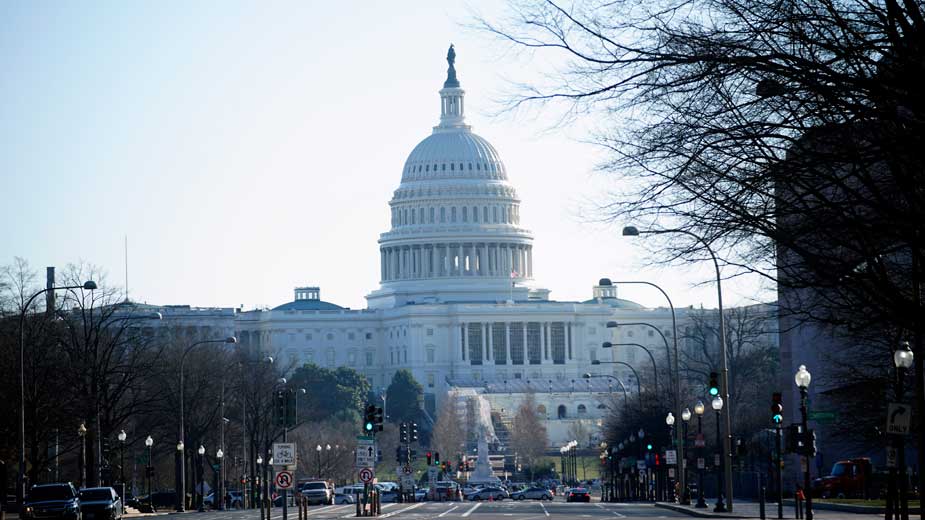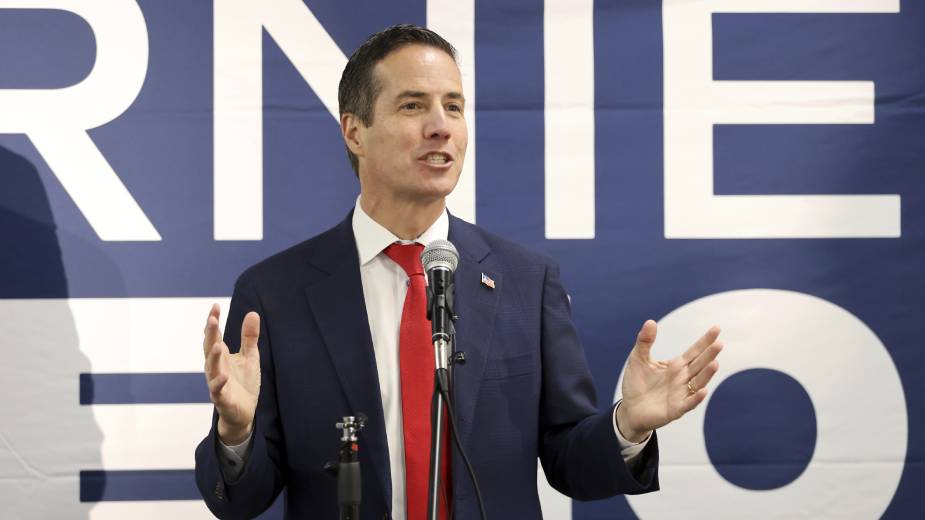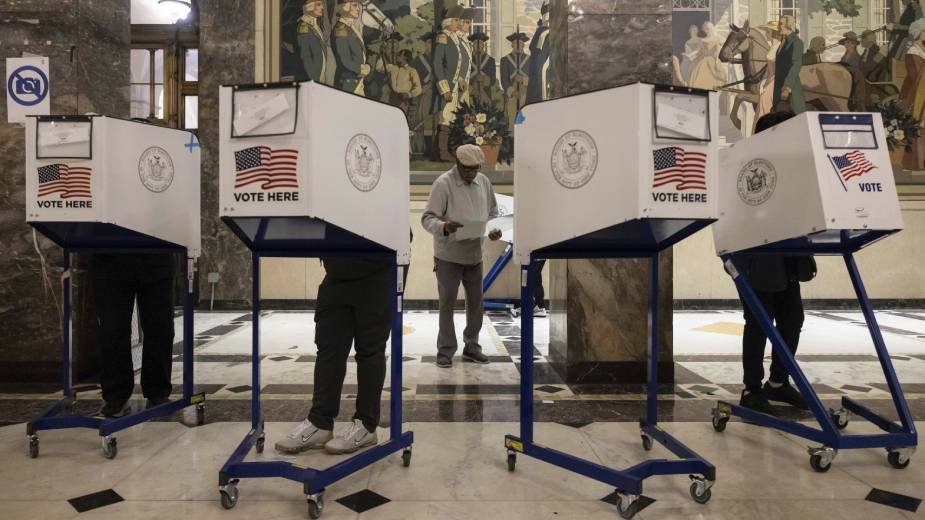What Happens Next? Local Leaders Weigh in after Chaos at Capitol
YOUNGSTOWN, Ohio – The storming of the Capitol by supporters of President Donald Trump on Wednesday likely ends his political career, but might encourage more political moderation, a Youngstown State University political scientist said.
Paul Sracic, chairman of YSU’s department of politics and international relations, was among several individuals contacted to share their insights regarding Wednesday’s invasion of the Capitol ground following a speech by Trump at a rally protesting certification of the 2020 presidential election’s results.
The Business Journal also spoke with elected officials, local party leaders and law scholars to see what Wednesday’s events could mean for the nation as it prepares to enter a new administration.
‘Shocking’ Assault
“It was shocking. No one expected the Capitol, that symbol of our legislature, to be invaded,” Sracic said. At the same time, the event visualized “the anger and division in the United States” that has been growing over the past 20 years.
Trump bears responsibility for his remarks at the rally, which the political scientist said precipitated his followers’ actions. Additionally, he faulted Trump for his continued baseless assertions that Joe Biden, the Democratic victor, won through fraudulent means.
“There’s a winner and a loser in every election but there’s a need for those who lost to be satisfied with the process. That’s crucial in a democracy,” he said. “We have a process and we accept when we lose. That’s what’s been damaged over the last few months.”
Despite the core of support Trump enjoys within the Republican Party’s base, Wednesday’s invasion of the Capitol by his supporters “fatally damages” him as a candidate, Sracic predicted. He will still have his core of supporters, but “a large percentage” of the 74 million people who voted for him last year won’t support him again after what they saw Wednesday, he said.
“Maybe what it does is it empowers the middle, empowers the moderates,” he continued. “The nation really needs those people in the middle to come together.”
Capri Cafaro, a professor at American University in Washington, D.C., and a former Ohio Senate minority leader, said she was similarly shocked by what she witnessed.
From her home in Trumbull County as she teaches remotely, said she viewed Wednesday’s events with a combination of “heartbreak and disgust.
“To see the seat of our democracy be invaded and defiled is unnerving and heartbreaking for anyone who loves this country,” she said.
Like Sracic, Cafaro said something like Wednesday’s events were “a long time coming. … While what we saw was shocking, I don’t think it’s necessarily surprising.”
Political divisions in the nation have continued to grow over the last five years, she continued. While there are “legitimate underpinnings to some of it,” where individuals feel that those in charge don’t relate or listen to them and they’ve been left behind, that marginalization has been manipulated by some for their own gain and amplified by social media and, to an extent, the mainstream media.
As evidenced by Wednesday’s events, despite recounts and certifications conducted by Democratic and Republican governors and elections officials, there is a group of Americans who don’t believe that the results of the election and the incoming administration are legitimate. Any Republican politician who wants to remain in their current position or advance to higher office has had to indulge in the kinds of stories or viewpoints Trump has advanced, regardless of their basis in fact.
”How do we get past this lack of trust in institutions and inability to establish mutual understanding of facts to find common ground and move forward?” Cafaro asks.
Additionally, both Sracic and Cafaro raised concerns about how Wednesday’s spectacle affects the nation’s image around the world.
Four years ago, Sracic recalled, he was asked to deliver a video lecture to the American consulate in Kabul, Afghanistan, to describe the U.S.’s success as a democracy. “This is so damaging to not just our country but to how the people look at us around the world. I couldn’t give that lecture again,” he said.
Removing a President?
“We can’t let what happened yesterday go unanswered,” said U.S. Rep. Tim Ryan, D-13 Ohio, during a virtual news conference Thursday.
The congressman said Trump whipped his supporters “into a frenzy” before they marched to the Capitol, where they forced their way past law enforcement and into the building, including the legislative chambers and officials’ offices.
“No president should be able to get away with that,” he said.
Ryan, who raised the prospect of Trump’s removal from office Wednesday night, said Thursday he had not spoken with any Trump cabinet members about a potential invocation of the 25th Amendment, though he has heard about conversations going on within the cabinet.
Several members of Congress Thursday joined Ryan’s call for invoking the amendment, including top Senate Democrat Chuck Schumer, House Speaker Nancy Pelosi, Republican U.S. Rep. Adam Kinzinger of Illinois and Ryan’s fellow Ohio Democrat, U.S. Sen. Sherrod Brown.
“Domestic terrorists attacked our seat of government, at the behest of the President of the United States. This was his last, desperate attempt to overturn the will of the American voters, but he failed, and democracy won,” Brown said. “We must hold the president accountable for inciting this attack on our country. The cabinet and vice president should immediately invoke the 25th Amendment to remove him from office, to prevent him from doing more damage between now and Inauguration Day.”
Because of how long impeachment – another topic that’s been discussed – takes, invoking the 25th Amendment might be more realistic of the two processes, Sracic said.
“The 25th Amendment can happen overnight. It can happen in a few hours,” he said.
All that’s required to enact Section 4 of the amendment is the vice president and a majority of Cabinet members declaring the president unable to do his job, likely through a letter to the president pro tempore of the Senate and Speaker of the House. While the president can object, the group can challenge the claim. Congress would then have 21 days to make a decision; the vice president would remain in power throughout the proceedings.
Cafaro acknowledged she is concerned about the consequences of keeping Trump in office until Jan. 20, because of national security issues and how the nation looks to its foreign adversaries, as well as Trump’s apparent abdication of job.
Cafaro also doesn’t think impeachment is the answer with less than two weeks left of Trump’s term in office. Invoking the 25th Amendment isn’t as tall of a task as impeachment, but “certainly has its barriers,” she said.
“Is it worth sowing even more division? Are we already throwing gasoline on a fire where already have this level of civil unrest?” she said.
Ohio Gov. Mike DeWine raised similar concerns during his Thursday update on the state’s coronavirus response. He said it’s a decision that needs to be made by those closest to the situation, including the vice president.
With just 13 days until President-elect Joe Biden takes office, DeWine said invoking the amendment now is something “that we would not want to see happen,” he said, because it could cause more division.
“I think that would stoke the fires of people who believe there’s a conspiracy,” he said. “And I think it would lessen faith in our system.”
“The bar for using Section 4 of the amendment is very high, especially against a president who is able to contest it,” said Brian Kalt, a constitutional law professor at Michigan State University whose specialty is the 25th Amendment. “But the closeness to the end of the term actually makes it more likely to be used.”
In ordinary times, the president would almost certainly get his powers back, Kalt said. In this case the vice president and his cabinet could, if they wanted to use Section 4, more easily run out the clock on Trump’s term.
Analyzing Security Response
During the midday conference call, Ryan, who serves as chairman of the legislative branch subcommittee of the House Appropriations Committee, said he and fellow U.S. Rep. Rose DeLauro would investigate Wednesday’s incident, particularly with respect to the security failures that permitted the protestors to breach the Capitol grounds and invade the Capitol Building.
Ryan laid the blame for the poor response to the leadership of the people responsible for providing security.
“I’m livid about the whole thing,” Ryan said. He reported that the House sergeant-at-arms and the head of the Capitol police had assured him that the available manpower was sufficient to keep protestors away from the capital.
Instead, there appeared to be no plan in place to expedite reinforcements when needed, and the police on hand were overwhelmed by protestors who were “hell bent on bum rushing” the officers. Many of the approximately 60 officers injured were hit with pipes, he said, and protestors also used pepper spray.
“These were not nice people that wanted to take a tour of the Capitol. They were violent,” he said.
The lack of a plan to quickly bring in reinforcements “was a strategic blunder and it put a lot of lives in danger,” he said. The intelligence and the treat assessment conducted prior to Wednesday also will be examined, particularly given that Trump had been telling his supporters for weeks Jan. 6 was “going to be a very important day for us.” News outlets have also reported that right-wing message boards had been discussing the opportunity for violence for several weeks.
Local and State Response
Gale Measel, president of GEM Building Contractors and Developers Inc. in New Castle, Pa., and chairman of the Lawrence County Republican Party, condemned Wednesday’s violence but also acknowledged people’s frustrations over the past four years.
“A lot of people don’t know what to believe. A lot of people are fighting for what they believe. We do that through a process. We do that through our legislators we elect, and vote in every election. A lot of them are carrying that torch,” Measel said.
At the same time, the actions of those who stormed the Capitol can’t be condoned, he added. “It’s not how we operate as American citizens. Anyone would have to say that’s inexcusable,” he said.
The Ohio Business Roundtable also issued a statement condemning Wednesday’s violence as “nothing less than an assault on our Constitution and our democracy,” and called on the nation’s political leaders, including Trump, to condemn it.
“We call on our leaders in government today to help our nation by beginning to work together to heal our country, and to represent their institutions in a manner worthy of this country and her people,” the organization said in a statement.
The Main Street Alliance board and executive leadership laid blame for the assault on the capital at the feet of Trump and his Republican allies and demanded accountability. Specifically, it called on Congress to support articles of impeachment for President Trump and a full investigation, and for passing “needed pro-democracy reforms” including the John Lewis Voting Rights Act and the For The People Act, which would expand voting rights, limit gerrymandering, strengthen federal ethics rules and limit private donations to campaigns.
“This is what treason looks like: an unhinged president inciting riot by an angry mob of armed white vigilantes,” the statement continued. “The threat to our government and the assault on our democracy was abetted by Republican leaders whose complicity in this attack must carry consequences including removal from office. Every official responsible, from the president to Senators, House Members to state legislators, who fed, fueled and fomented these attacks must be held accountable.”
Sidney Jones, managing director and wealth management adviser at Merrill Lynch Wealth Management, said he does not see long-term consequences from Wednesday’s events.
Rather than the chaos in the Capitol, the markets were responding to the election of Democrats in the Georgia special election to fill two U.S. Senate seats – leaving the Senate split 50-50, with the deciding vote in the hands of Vice President Kamala Harris – and the prospects for increased federal economic stimulus, Jones said.
“The market is a forward-looking mechanism, not current and not backward,” he said.
Jeremy Lydic, Josh Medore, George Nelson and John Vargo contributed to this report.
Pictured at top: The U.S. Capitol is seen the day after violent protesters loyal to President Donald Trump stormed the U.S. Congress, Thursday, Jan. 7, 2021, in Washington. (AP Photo/Matt Slocum)
Copyright 2024 The Business Journal, Youngstown, Ohio.



